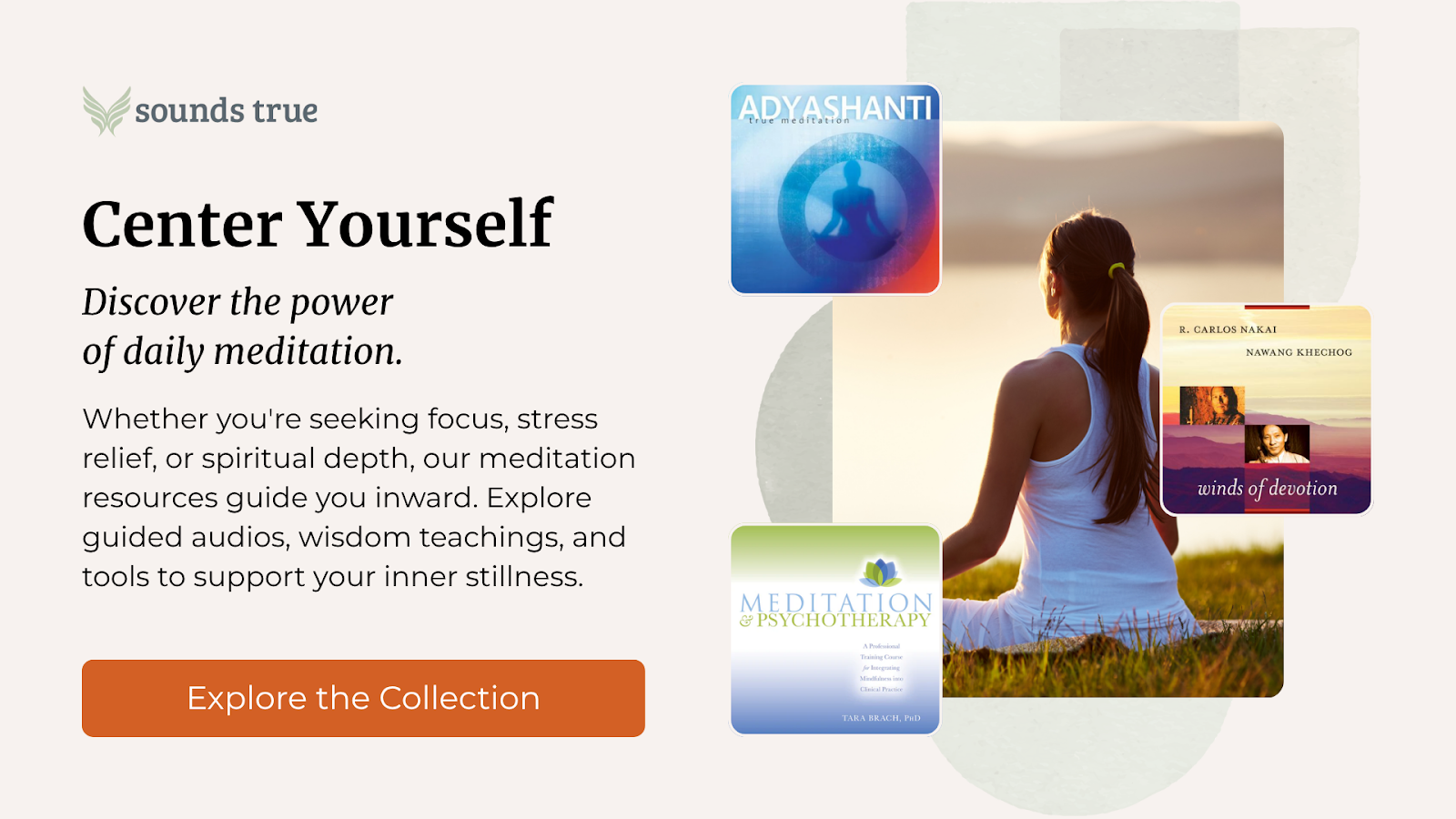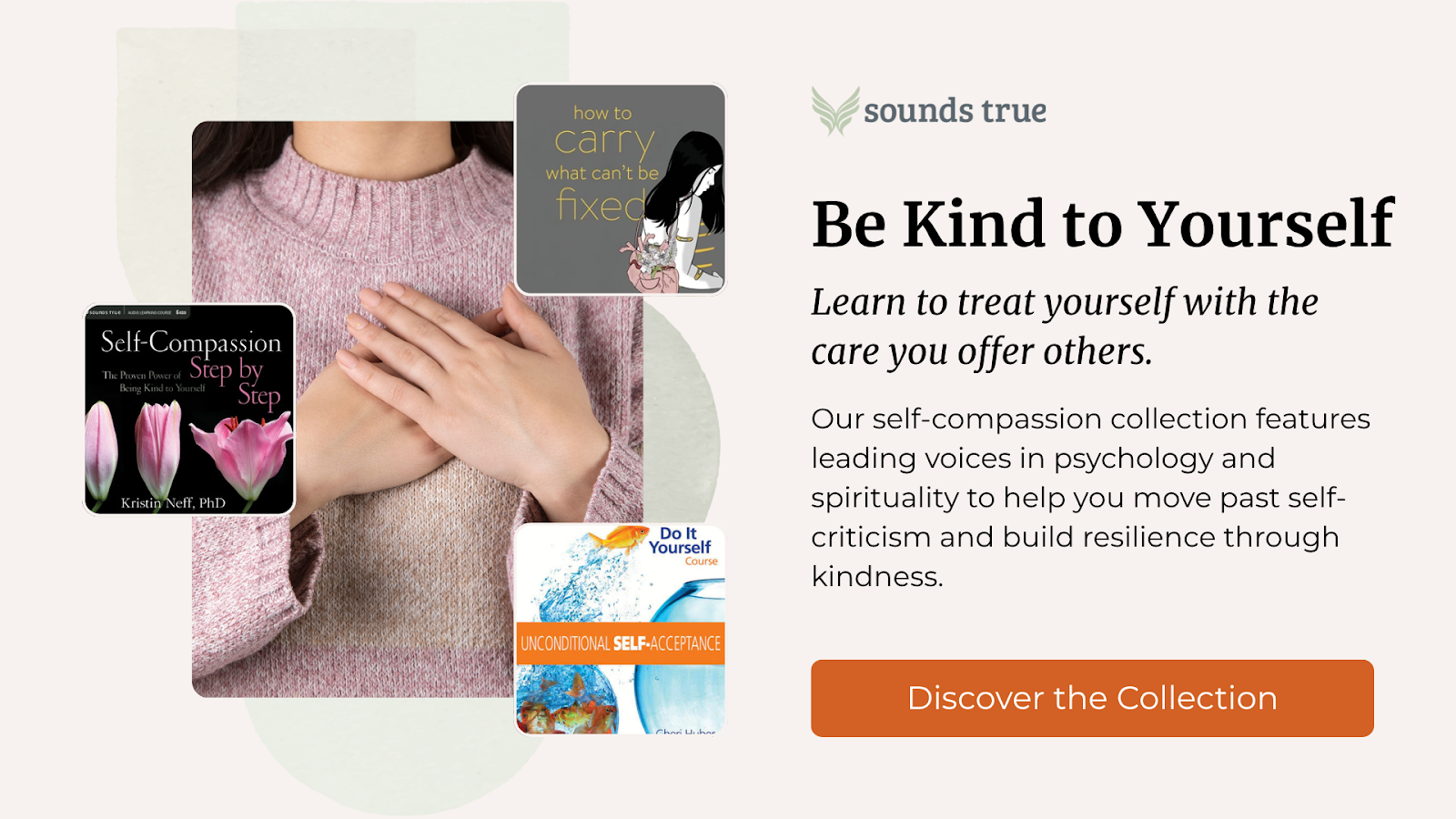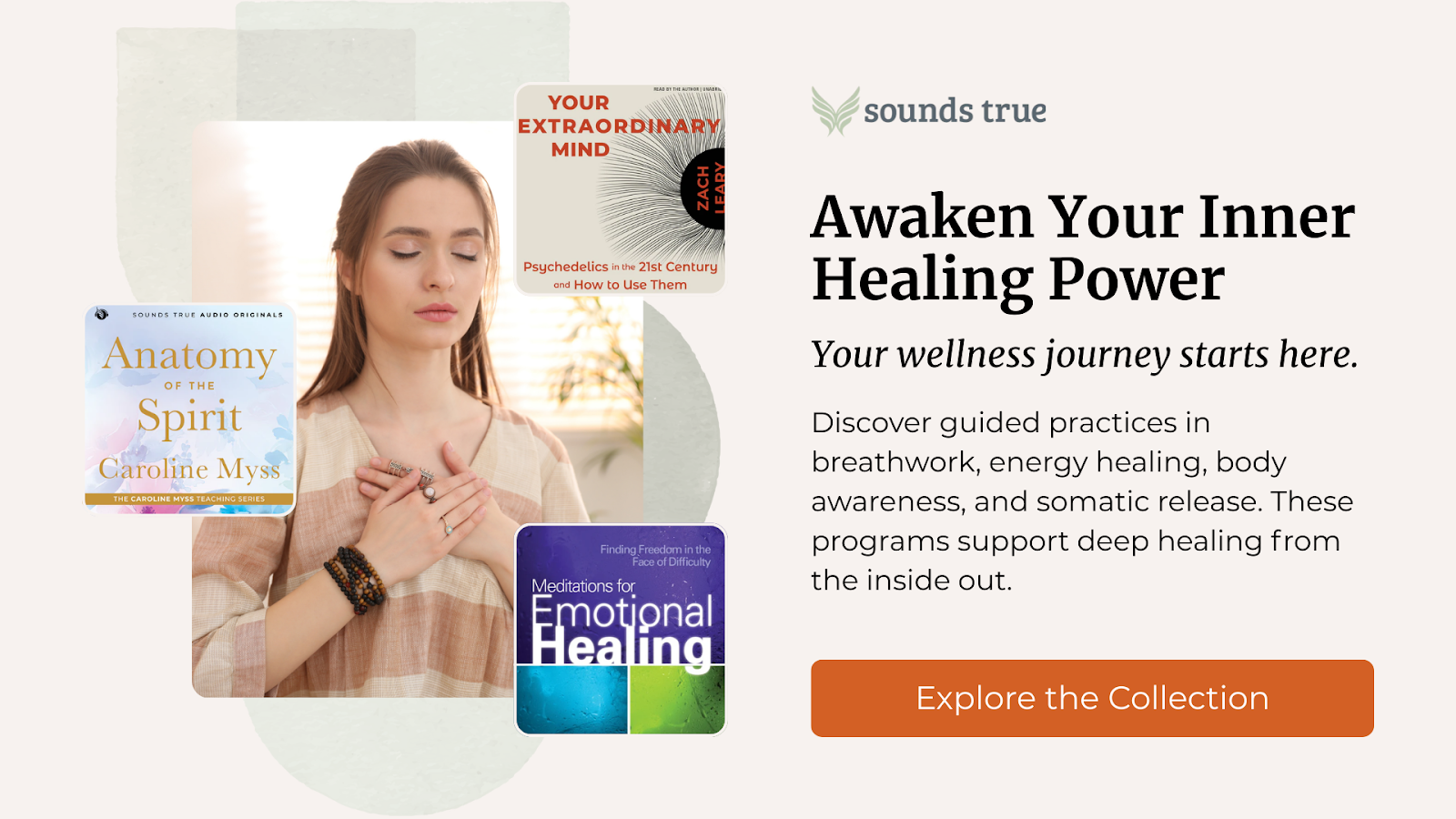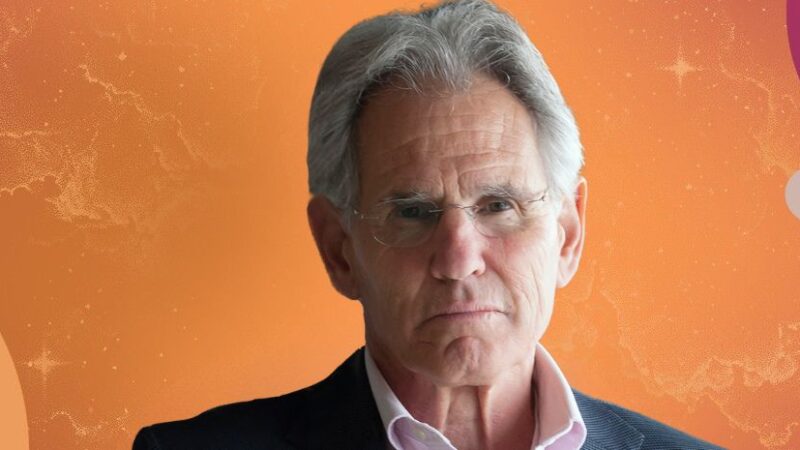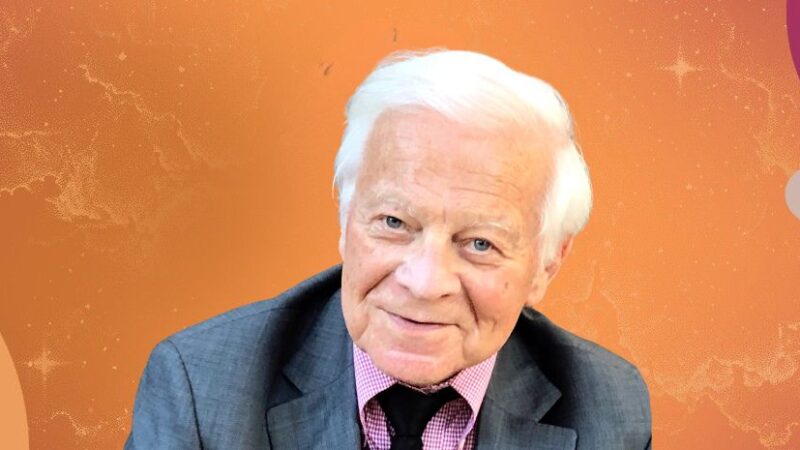If you’re anything like us at Sounds True, you know how quickly the velocity of daily life can carry you off course. Between overflowing inboxes, familial demands, and the steady pulse of news and notifications, it can feel as if your inner compass has gone quiet. Yet, beneath the noise, many of us sense an age-old wisdom gently calling us home, a voice that invites us to pause, breathe, and reconnect with presence.
Meditation, with roots stretching across cultures and centuries, has found its way from ancient temples to modern living rooms. At its heart, meditation is both a balm for tired nerves and a trusted guide toward deeper self-awareness. In this article, we’ll explore the benefits of meditation, from stress relief to inner growth, while sharing how this practice continues to resonate across generations.
Key Takeaways:
- Alleviates Stress and Calms Nerves: Meditation offers a powerful remedy for stress relief, fostering calm and presence amid the noise of modern life.
- Sharpens Focus, Attention Span, and Brain Health: Regular practice of meditation nurtures self-compassion and emotional regulation and enhances focus, attention span, and brain health over time.
- Supports Cardiovascular Health and Improves Sleep: By promoting relaxation and supporting cardiovascular health, meditation serves as a holistic approach to well-being, encouraging mental and physical resilience in the long run.
Stress Relief in a Busy World
Modern life asks a lot from us. Between tight deadlines, constant notifications, and the whirlwind of personal responsibilities, overwhelm has become a companion for many. When stress starts to feel like the air we breathe, it’s easy to lose track of our health. Scientific research shows that even a few minutes of mindful breathing can reduce cortisol, the primary stress hormone, and create a tangible sense of calm.
What makes this practice so accessible is how easily it can be woven into ordinary moments. A pause on a subway ride, three slow breaths at the kitchen table, or mindful steps along a rain-soaked street all become openings to reconnect with yourself. With time, these pauses reshape the inner landscape. The pressures of daily life remain, yet meditation softens their edges. Space opens between challenge and response, allowing patience and clarity to rise where reactivity once lived.
Calms the Nervous System
When life rushes in with deadlines, difficult conversations, or the steady ping of notifications, our bodies naturally shift into high alert. The heart pounds, breathing becomes shallow, and our thoughts may dart from one worry to the next. This response, what scientists call the “fight, flight, or freeze” mode, is hardwired for survival, but in our modern lives, it too often leaves us feeling drained and on edge.
Through steady practice, meditation helps guide the body back into homeostasis. Attention settles on the breath or the quiet sensations within, and the nervous system receives a signal to step out of overdrive. Scientific studies confirm what many practitioners describe: brain scans show reduced activity in the amygdala, the brain’s alarm center, and stronger activation in areas linked to calm and regulation. In this way, the benefits of meditation extend beyond temporary relief and begin to reset the body’s baseline toward steadiness.
Helps Cultivate Self-Compassion
Self-compassion isn’t a faraway ideal reserved only for saints and sages—it’s an inner quality accessible to each of us, right now. Through meditation, we begin to notice the ceaseless hum of our inner critic: those looping thoughts of not-enoughness, the nagging shame, the echoes of past mistakes. In this way, the benefits of meditation include learning to care for ourselves from the inside out.
Picture yourself sitting quietly, eyes closed, breath softening. When difficult emotions emerge, the practice is to greet them like an old friend, rather than a hostile intruder. During meditation, we learn that compassion for ourselves is an act of courage to stay with our own discomfort long enough to see the wounded places within us, and respond with, “It’s okay. I see you. You’re worthy of care.”
Over time, the benefits of meditation unfold in subtle but transformative ways. We become kinder, not because our problems vanish, but because we build a well of patience and empathy within.
Sharpens Focus and Boosts Attention Span
Distractions tug at us constantly, like rereading the same line, losing track in a meeting, or drifting away during a conversation. In a world of constant stimulation, the ability to hold steady attention feels rare. Through meditation, we begin retraining the mind to focus on the parts that matter. This is one of the quiet but lasting benefits of meditation.
During practice, the wandering mind becomes a teacher. Each time attention slips, we notice the drift and gently return to the breath, a mantra, or another chosen anchor. Far from being a failure, this repetition is the exercise itself. Studies confirm what practitioners have observed for centuries: consistent meditation strengthens brain regions tied to focus, such as the anterior cingulate cortex, leading to greater concentration and longer attention spans.
As these skills develop, their impact shows up beyond formal practice. At work, meditation helps sustain focus through long projects. In conversation, it steadies our presence so we truly hear others. Even in creative pursuits, the habit of returning attention makes space for deeper flow. With time, meditation feels less like “mental strength training” and more like an art of attention, an ongoing practice that helps us reclaim authority over where our energy rests.
Supports Deeper, Restorative Sleep
Sleep. We all crave it, but it can feel elusive with constant notifications, late-night worries, and racing thoughts. If you’re reading this, chances are you’ve spent a restless night or two tossing and turning, only to wake up feeling anything but restored. Here’s the gentle truth: meditation can be a true ally in your quest for genuine, restful sleep.
During evening practice, guided meditations, body scans, or mindful breathing help quiet the nervous system. Cortisol levels ease, muscles soften, and the body begins to release the day. This quieting process draws on the very skills cultivated in meditation during the day. For example, stress relief helps untangle anxious thoughts before sleep, while sharpened focus nurtures the ability to let distractions drift away instead of spiraling into wakefulness.
Furthermore, scientific research echoes this lived experience. Meditators often report falling asleep more easily, waking less often, and greeting mornings with a renewed sense of clarity. These benefits arise because meditation gradually retrains the mind and body toward balance, replacing restless cycles with presence and calm.
Balances Blood Pressure and Cardiovascular Health
The heart feels the weight of daily stress as much as the mind does. Deadlines, constant notifications, and unspoken worries all leave their mark, often showing up as elevated blood pressure and strain on the cardiovascular system. Over time, this tension can quietly compromise long-term health.
Through steady practice, meditation helps the body return to balance. By activating the parasympathetic “rest and digest” response, meditation shifts us out of the constant alertness that fuels high blood pressure. Scientific studies reveal measurable results: consistent practice has been linked to lower blood pressure, steadier heart rhythms, and greater resilience across the circulatory system. These changes ripple outward, supporting both mind and body in living with more ease.
Stress relief and restorative sleep, two of the most well-known benefits of meditation, play an important role here. When stress levels decline, the heart no longer strains against constant tension. When sleep deepens, the body resets more fully, giving the cardiovascular system a chance to rest. Together, these effects create the conditions for healthier blood flow and a steadier pulse. In each session, the practice becomes a way of listening inward.
Supports Brain Health and Healthy Aging
The benefits of meditation ripple far beyond the moments you spend sitting in stillness. Recent research shines a gentle spotlight on a compelling truth: a regular meditation practice can actually nurture our brains, helping us age more gracefully, inside and out.
During meditation, attention settles on the breath, a mantra, or the unfolding present. This gentle focus guides the nervous system into rest and renewal. Over time, such practice has been linked to thickening of the prefrontal cortex, the area responsible for decision-making, executive function, and self-control. These changes can sharpen memory, strengthen focus, and foster emotional resilience as the years progress.
The practice also calms the amygdala, the brain’s internal alarm system. As reactivity softens, stress hormones like cortisol decrease, which may ease inflammation tied to disease and cognitive decline. In this way, the calming effects of meditation ripple outward, benefiting both mental and physical health.
Final Thoughts
At Sounds True, we believe the journey of meditation is less about mastering technique and more about softening into presence. From soothing frazzled nerves to nurturing meaningful growth within, the benefits of meditation ripple through every layer of our being. In a world that often moves too fast and asks for too much, this quiet inner practice becomes a gentle act of self-kindness, an invitation to listen deeply, and a way of honoring our own inner wisdom.
What feels most remarkable is how accessible the path is. Anyone can begin, and every mindful breath becomes a stepping stone back home to the self. Our invitation is simple: explore with curiosity, practice with gentleness, and let your heart remain the compass that guides you.
Read More:
- Honey Tasting Meditation: Build Your Relationship With Sweetness
- Take Your Inner Child On Playdates
- If You Are Postpartum And Bereaved, Know You Are Not Alone
Frequently Asked Questions About the Benefits of Meditation
What are the main types of meditation?
Mindfulness meditation is perhaps the best known. Metta meditation nudges us to open our hearts and cultivate compassion for ourselves and others. Guided meditations feature a teacher or recording leading you inward, while mantra meditation uses repeated words or phrases for grounding. Likewise, practices like walking meditation or gentle yoga merge physical presence with mindful awareness. At Sounds True, we celebrate them all, as every pathway has its own gifts.
Can meditation improve mental health?
Yes, and for many, it’s nothing short of transformative. Regular practice has been shown to help reduce stress, anxiety, and feelings of overwhelm. It supports emotional resilience, cultivates clarity, and brings a greater sense of peace, even amid life’s ups and downs. Many find meditation seeds a gentle confidence, empowering them to meet challenges with compassion and courage.
How long should I meditate each day?
There’s no single rule, and every minute counts. Many teachers suggest starting with just five or ten minutes daily. Over time, you may discover a sweet spot that feels right for you, whether it’s twenty minutes, half an hour, or simply a handful of mindful moments woven throughout your day. Think of meditation less as a strict assignment and more as a practice of meeting yourself, just as you are, and returning again and again.
How does meditation affect physical health?
The benefits of meditation do ripple out into the body. Studies suggest that regular meditation may help lower blood pressure, reduce inflammation, and support immune functioning. It can ease muscle tension and promote restorative sleep.
Can meditation help with sleep problems?
Absolutely. There’s growing evidence that meditation can quiet the busy mind at bedtime. Mindfulness and body scan practices, in particular, help relax the nervous system and signal to your body that it’s safe to rest. With regular practice, many people find it easier to fall asleep and enjoy deeper, more restorative sleep. If insomnia is a challenge, meditation can be a gentle light in the dark, guiding you back to comfort and calm.
Can meditation help with work-related stress?
Yes. Work can be one of life’s richest and most stressful journeys. Meditation offers tools to pause, breathe, and reconnect to what matters amidst the pressure. Even a few mindful breaths at your desk can shift your perspective, reduce anxiety, and sharpen your focus. Teams and workplaces across the world are waking up to the value of meditation for greater resilience, empathy, and clear communication.
Is it normal to have thoughts during meditation?
Meditation isn’t about emptying your mind or achieving “perfect stillness.” Thoughts, emotions, and sensations will arise. The practice is in noticing them without judgment, and gently returning to your breath, your anchor, or your mantra. Each return is a moment of learning and self-compassion. As heartfelt teachers remind us at Sounds True, every meditation is “right,” simply because you showed up.

Michelle Cassandra Johnson is an author, activist, spiritual teacher, racial equity consultant, and intuitive healer. She is the author of six books, including Skill in Action and Finding Refuge. Amy Burtaine is a leadership coach and racial equity trainer. With Robin DiAngelo, she is the coauthor of The Facilitator's Guide for White Affinity Groups. For more, visit https://www.michellecjohnson.com/wisdom-of-the-hive.
